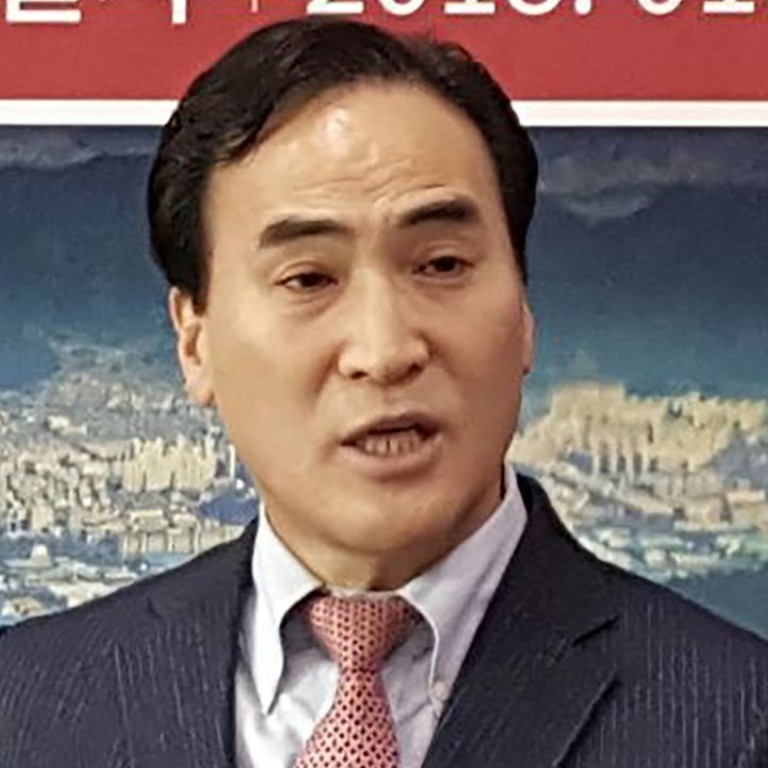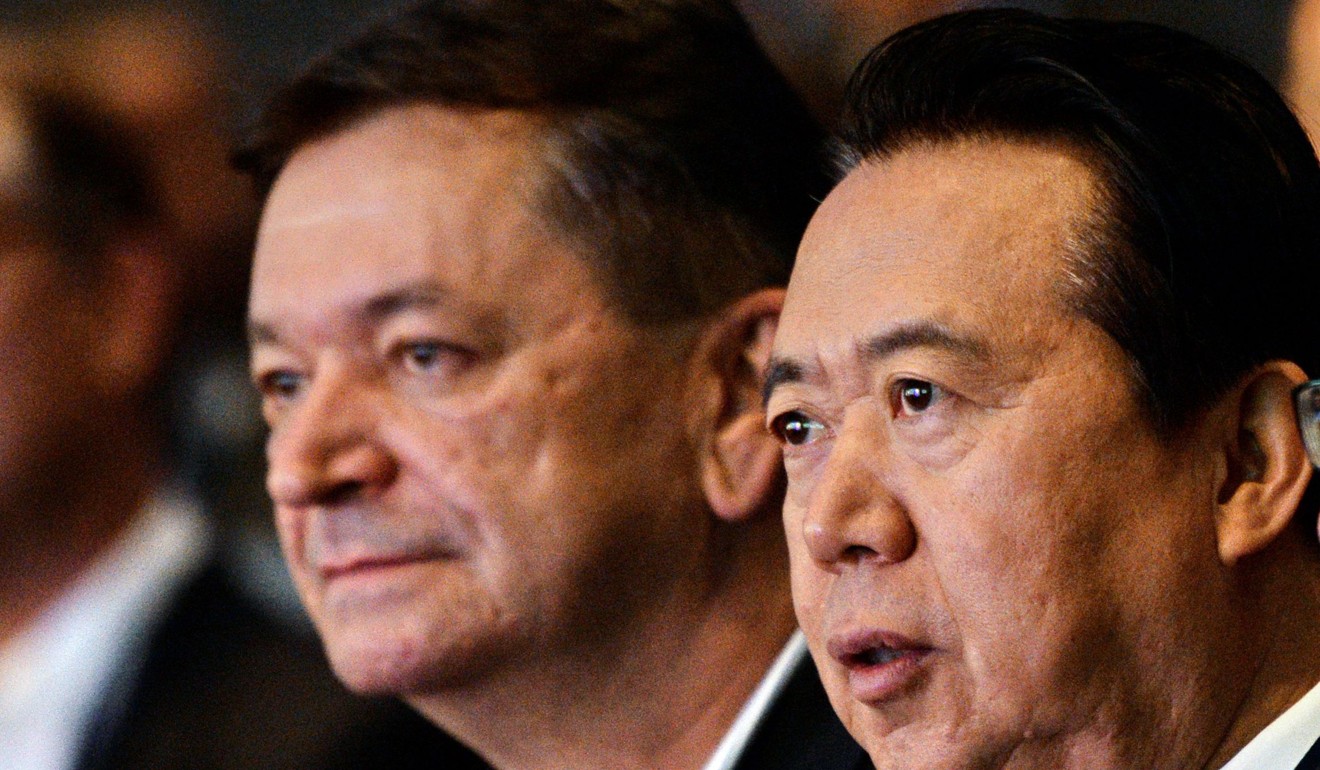
South Korean Kim Jong-yang elected new head of Interpol after last-ditch bid to block Russian candidate
- Delegates from Interpol member countries elected Kim, a relative unknown, to replace Meng Hongwei, who went missing in his native China in September
- Beijing later said Meng resigned after being charged with accepting bribes. Kim will serve out Meng’s term until 2020
Interpol announced on Wednesday that Kim Jong-yang of South Korea had been chosen as its new president, beating a Russian official whose candidacy had unnerved Western nations.
The US-backed Kim, acting president of the global police body, was picked at a meeting of delegates from member nations in Dubai to replace Meng Hongwei, who went missing in his native China in September. Beijing later said Meng resigned after being charged with accepting bribes.
There had been growing calls within Western nations for Interpol to reject Russian candidate Alexander Prokopchuk – a Russian interior ministry official and current Interpol vice-president – over fears Moscow could abuse the role to target political opponents.
On Tuesday, US Secretary of State Mike Pompeo threw his weight behind the 57-year-old Kim, who will serve out Meng’s term until 2020.
“We encourage all nations and organisations that are part of Interpol and that respect the rule of law to choose a leader with integrity. We believe Mr. Kim will be just that,” Pompeo told reporters.
Kim, a relative unknown even in his native country until today, worked in the South Korean police for more than 20 years before retiring in 2015 to take up the post of Interpol vice-president.
He had been chief of police in Gyeonggi province before that, and also had a brief stint as a secretary at the Ministry of Transport after graduating from Korea University with a degree in business administration. He joined Interpol in 2012.
Before Kim’s appointment, critics had raised concerns over Russia’s candidate for the position - noting previous applications for Interpol “Red Notices”, or international arrest warrants, to target those who have fallen foul of the Kremlin.
Russia routinely abuses Interpol for the purpose of settling scores and harassing political opponents
Although Interpol’s new South Korean president evidently worked his way up to the position, analysts said his election to the top spot was given a boost by politicking between the US and Russia.
“I think in many ways the US was thinking, ‘Who we can make a decent argument for to prevent the Russian candidate?’” said Matthias Maass, a professor of international relations and international law at Yonsei University in Seoul. “It tells us more about international politics and high stakes diplomacy than anything about the quality of the individual.”
Interpol’s president chairs its General Assembly while day-to-day operations are handled by the organisation’s secretary general, Juergen Stock.
In an open letter this week, a bipartisan group of US senators said choosing Prokopchuk would be like “putting a fox in charge of a henhouse”.
“Russia routinely abuses Interpol for the purpose of settling scores and harassing political opponents, dissidents and journalists,” they wrote.
Harriett Baldwin, a minister of state at the British foreign office, told parliament on Tuesday that London would support Kim’s bid.
Anti-Kremlin figures had also raised concerns, including Alexei Navalny, the Russian opposition leader who has been repeatedly jailed by authorities.
“Our team has suffered from abuse of Interpol for political persecution by Russia,” Navalny wrote on Twitter. “I don’t think that a president from Russia will help to reduce such violations.”
Interpol can’t investigate Chinese president’s disappearance because its own rules don’t allow it
US National Security Council spokesman Garrett Marquis echoed Pompeo’s endorsement of Kim.
“As recent events show, the Russian government abuses Inteprol’s processes to harass its political opponents,” he said on Twitter.

The succession controversy coincides with security concerns over accusations of Russian agents attempting to poison an ex-spy in Britain and trying to hack the network of the global chemical weapons watchdog.
Ukraine, deeply at odds with Moscow over its annexation of Crimea and support for separatists, threatened to pull out of Interpol if Prokopchuk prevailed. Lithuania also said it would consider withdrawing from the network.
The Interpol constitution has very specific rules which forbid countries who are serial abusers from using the system
Russian presidential spokesman Dmitry Peskov dismissed the US senators’ letter as a “vivid example” of an attempt to interfere in the vote.
Moscow’s interior ministry denounced a “foreign media campaign aimed at discrediting Russia’s candidate”. But two foes of Russian President Vladimir Putin, who have been targeted by international arrest warrants sought by Moscow, also said Tuesday they were launching a bid to get Russia suspended from Interpol for abusing the agency.
The legal challenge was announced by financier Bill Browder, named in multiple Interpol warrants, and Mikhail Khodorkovsky – a former oil baron who spent 10 years in a Russian jail and now lives in exile in London.
“The Interpol constitution has very specific rules which forbid countries who are serial abusers from using the system,” Browder told reporters.
Briefly arrested in Spain this year under a Moscow-issued Red Notice, Browder said the Russian candidacy was an attempt by Putin to “expand his criminal tentacles to every corner of the globe”.
Russia denounces Western ‘interference’ in Interpol leadership vote
He fought for – and in 2012 secured – US sanctions against Russian officials believed to be involved in the death of his tax consultant, Sergei Magnitsky.
Magnitsky died in jail in 2009 after accusing Russian officials of a US$230 million tax fraud.
China’s detention of ex-Interpol chief highlights the arrogance of its anti-corruption investigators
Russia has rejected the claims and this week announced it was opening a new probe into Browder on suspicion of running a “transnational criminal gang”, even suggesting he was behind Magnitsky’s death.
Russian prosecutors said he would be put on an international wanted list “in the near future”.
Multilingual Prokopchuk worked in tax enforcement before starting as a Russian representative at Interpol in 2006, according to the interior ministry.
Additional reporting by Josh Doyle

.png?itok=arIb17P0)